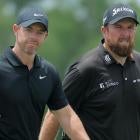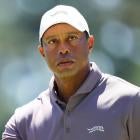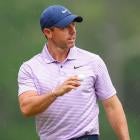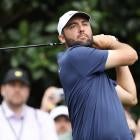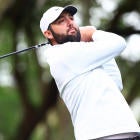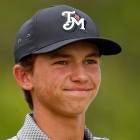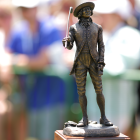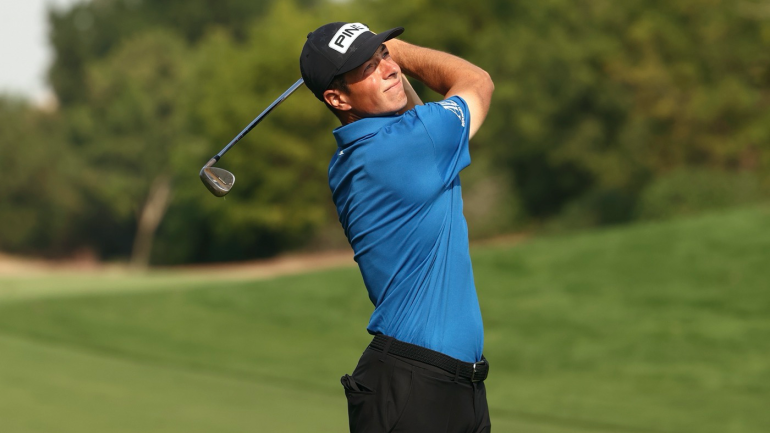
On the Saturday evening during the U.S. Open at Winged Foot in September, golf was on the verge of seeing two golfers who 18 months ago were amateurs win the first two major championships of 2020. Following Collin Morikawa's victory at the PGA Championship at Harding Park in September, Wolff was playing in the final pairing with Bryson DeChambeau at Winged Foot. He got rolled by the big man, but the fact that this was on the table at all with two kids ages 24 or younger in the era of Justin Thomas, Dustin Johnson and Rory McIlroy seemed completely absurd.
Of course, every generation in golf -- and probably all sports -- lays claim to the moniker of "best crop of young stars ever" or some ridiculous thing like that. And while it feels like a preposterous thing to buy into, the data in this instance, at least with where we're at with golf, is incontrovertible. Consider this nugget from Justin Ray from earlier this year.
Since 1985, there have been five PGA Tour seasons where the average winner's age was under 31.1. All five of those seasons have come since 2014, including the record-setting 2016-17 wraparound campaign, where the average winner was just 28.8. That season, a staggering 42 percent of tournaments were won by players age 25 or younger.
This should not be surprising. The generation following the Tiger Woods generation would naturally be better, more competitive and deeper than ever before given how much Tiger inspired kids and -- more importantly -- how much more money he infused the game with.
With all of this in mind, we need to take a look at the best of one of the great young generations in golf history and sort out both where they're at and what's next. The best way to do that is to rank them by highest ceiling and go from there, so let's start with somebody I did not envision ranking No. 1 at the start of 2020.
1. Viktor Hovland (OWGR: 14)
Hovland is certainly not the most accomplished of this crop of sub-25 golfers, but I do think he's the scariest from tee to green. Data Golf shows that his 21-year-old season was similar to Rory McIlroy's at the same age, and that his 22-year-old season was akin to Justin Thomas'. Pretty decent company. Both of those players -- along with the others Hovland is compared to -- took a big leap at 23 and 24 (which is what Hovland is entering into), but he has the toolset -- 2.02 and 1.37 strokes gained tee to green in 2019 and 2020 respectively -- to make that leap. His short game needs improvement and he needs to mix it up at some bigger events, but the foundation is there for Hovland to eventually reign as the best of this bunch. Next up: Win a Genesis Invitational or Memorial -- some big-boy tournament to get into the top 10 in the world.
2. Collin Morikawa (7)
His career has followed Hideki Matsuyama's almost identically, and that's a good comp for him. He gets minor points deducted here because he's a little older than Hovland, Wolff and Im, but he's definitely the best iron player of that group (although Hovland is underrated as an iron player). He's a zero putter (always around 0.0 strokes gained on the greens), which is fine given his elite ball-striking. The big question for him will be whether he can keep up with the rest of this group off the tee considering the fact that he'll probably be around 100th or worse in driving distance and most of the rest of these guys are in the top 25. Next up: Develop greater consistency at the biggest events.
Want the sharpest DFS advice, picks and data-driven golf analysis? Listen below and subscribe to The First Cut Golf podcast where we explain what's happening on the course so you can win off of it.
3. Matthew Wolff (15)
He's the hardest one on here for me. On one hand, his numbers don't totally match the perception of what he's done. For example, Sungjae Im had better 21-year-old and 22-year-old seasons than Wolff (so far). He's a better putter than maybe anyone on this list, but his short game thus far has been lousy (which is not unexpected). On the other hand, there's a component to Wolff that is completely intangible: he has it. He's electrifying. He's telling other golfers to say hey to their wives for him on his way to the first tee in the last pairing at his first U.S. Open. He legitimately could have won the first two majors of 2020. He's also way, way younger than most of the players on this list. Sometimes we like to lump all the "young guys" in together, but there is a wild difference between being 21 and 8 months and nearly 25 (like Scheffler). The next two years will be fascinating. Next up: Become a mainstay at smaller tournaments.
4. Scottie Scheffler (31)
I'm officially intrigued, although this might be a situation like you see in the NBA where a really successful college senior comes into the league and finds similar success professionally, but that's sort of the ceiling of where he's going to be because he's so much older relative to the other young players. Technically the best of the group over the last 12 months in strokes gained, but he's also more fully formed. Still, the early career arc so far is a bit Mickelsonian! Next up: Win.
I am *deep* on the @DataGolf site as we start thinking about 2021 and this intrigues me. 🤔 pic.twitter.com/RVDuYMqoH0
— Kyle Porter (@KylePorterCBS) December 28, 2020
5. Sungjae Im (18)
Rickie Fowler or Jason Day is a good comp for him, according to Data Golf. Though he was better than Wolff as a 21-year-old, he's not as good with his irons as the four guys ahead of him on this list. He takes away a little of the alluring aspect of the unknown because he plays every single week, so you pretty much know who he is at this point. However, if he can develop his iron play just a little bit more he has a chance to match a Fowler- or Day-like production, which would be a pretty great career. Next up: Get involved at a major.
6. Joaquin Niemann (45):
The forgotten man among this crowd, but he's barely 22 years old and pacing pretty nicely with the first part of Adam Scott's incredibly successful career. Next up: Win a non-fall event.













